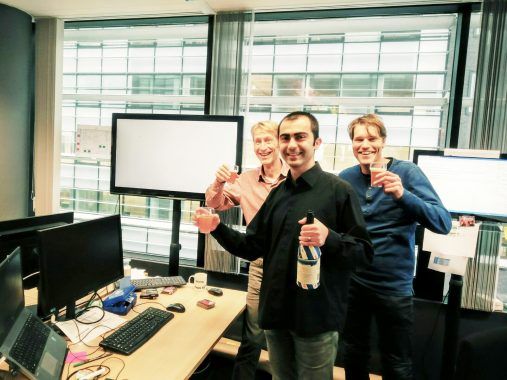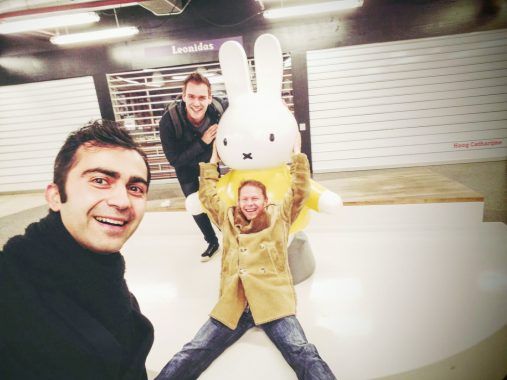Life as an expat at bol.com
While working abroad as an expat might sound like an exciting opportunity with noteworthy advantages, "adaptation" constitutes the dominant factor of the entire challenge. Which language will you use for communication? What about cultural differences? To what extent will you socially get accepted by the community? And what will you be leaving behind by accepting the offer? And don't forget the other side of the coin: almost all of these questions can be applicable to the native (Dutch) employees currently employed. I have been working at bol.com as a software engineer for more than two years. As someone who has migrated from Turkey just after his PhD, these were the questions I kept asking myself before coming to and also during my time at bol.com. Here I will try to draw an outline of my answers from a bol.com employee perspective.
Expats with numbers
While the current outlook of bol.com staff does look relatively diverse in terms of nationality, this has not always been the case. The acquisition by Ahold in 2012 enhanced the international vision of the company and sped up the already ongoing progress of internationalization efforts, including the HR process revamp to adapt the needs of the expats. As of December 2016, bol.com is a company staffed by 1183 employees, where the IT department covers an amount of 308. Among these people, there are 57 expats from 27 different nationalities, where the share of the IT is 52. Approximately, 1/3 of the every new IT hire is an expat.
Closing the red tape deal
Putting working aside, settling down in the Netherlands for living is a challenge on its own. If you are expecting all the red tape work (getting an identity number and card, registering with the tax authorities, opening a bank account, renting a house, setting up the utilities, etc.) to be served to you in English, you need to know that it will not be the case. It is well-known that Dutch people are pretty fluent in English and eager to help -- this is a big plus.
No, we are not celebrating anything. Walter had this special Frisian beer bottle one year ago and its was due that day. Taking advantage of Walter’s absence and feeling too bad about the fact that the beer will be spoiled in 24 hours, we decided to fulfill a destiny in front of the not-working RaspberryPi-powered monitoring screens that we should have been fixing.

But one thing that I personally found indispensably valuable is the settling assistance provided by an external company arranged by bol.com. In a nutshell, the company assigns you to one of their co-workers as a personal assistant throughout your entire exhausting settling experience. The co-worker companies you to get a BSN (The Citizen Service Number), register with the tax authorities, communicate with real-estate agencies, and even help for bargaining, sharing personal knowledge on certain parts of the city while looking for a house, etc. In my case, the completion of this entire process took close to 2 months, which would not have been possible at all without such a guidance.
We were saving the holy Nijntje statue from late night vandals in Utrecht.

The contact
From an IT department employee perspective, you generally end up in one of the Scrum teams. You will immediately realize that you are surrounded with like-minded smart people. You have your in-team stand-up, retrospective, etc. meetings in English. You will quite often hear Dutch jokes in the air, where your colleagues generally (almost) always switch to English in the presence of an expat. E-mails targeting a group of people are either in English or have an English translation at the bottom. The employee information screens (e.g. where you see your payment history and o days) and company-wise documents are either in English or have an English version. The cafeteria personnel, colleagues from other departments, the staff who maintains the coffee machines, etc. They all speak to you in English. Though when you express an intent to talk in Dutch, everybody shows a willingness to help you. Some of the company meetings targeting a bigger audience (e.g. while announcing the next year plans) and/or incorporating Dutch cultural footprints (e.g. pancake day, Sinterklaas) can still be presented in Dutch. For those cases, bol.com provides translator headsets for expats. I can understand such talks are in Dutch, but I am not a fan of headsets. After 2 years of daily exposure to Dutch, I think I've started to get the gist of the talks.
Work is not always about work. Every Friday company organized borrels take place, where free drinks are served “by the employees, for the employees”. Sadly you need to apply to be a bartender, since there is a long list of other waiting applicants! It is a good opportunity to meet with new people and get to know them. As before, the language is not a problem, everybody gladly switches to English if asked for. That being said, after a certain amount of alcohol, I feel like my chakras for understanding Dutch discussions turn open. Or maybe it is just me. Further, you will also notice that there is an ongoing, never- ending celebration for people who are having a birthday, a new baby, just back from vacation, married, finished an important story on their board, etc. So there is an endless supply of treats for these occasions in the kitchen. Typical Dutch customs. Pro tip: try to pick a desk away from the kitchen! There are also other social activities which I did not have time to attend yet: City tours, console game and soccer tournaments, yoga, pilates, and martial art classes, etc. I do not know the state of ethnicity and integration for these activities, but I am pretty sure a Dutch guy/girl will curse you in Dutch during a foul in a soccer match, of which I surely would reply back in Turkish. You know the game, right?
Bol.com provides a self-development budget for each employee. Expats within the company are encouraged to take Dutch classes. Plus, bol.com itself also offers in-house Dutch classes for the first 3 months (hence, you don’t need to travel to another part of town) and these study hours will not be deducted from your regular working hours. After 3 months, you can still prefer to purpose your self-development budget for Dutch classes, but you are expected to be responsible for the compensation of the spent hours. Since this budget is not just for expats, you will also observe that there are Dutch colleagues which are taking English classes too. You know, learning is a process that never ends. Me? I prefer paying the Dutch classes from personal funds and using bol.com contribution for technical trainings, conferences, and so on. Though, your mileage may vary.
Say hello to your countrymen
Sometimes it is handy to just talk with someone from your own country. Luckily, there is almost always such a “someone”. You can join a Turkish group having lunch in the cafeteria, you don’t want tomiss the food that an Indian brings when returning back from vacation, or consult a Greek, Spanish, or Romanian for the best holiday places around their country. While such an atmosphere has the potential to provide an isolation for foreigners, my observation is the opposite: most expats just mix up with every other colleague.
The good, the bad and the ugly
So far I had a close to flawless transition. That being said, I admit that I also met with a couple of other expats with different opinions. My observation is that the cause of such unfortunate experiences generally surface due to either lack of necessary awareness or not being well-prepared to communicate in English. In the opposite, sometimes it might also take a while for your Dutch team mates to feel comfortable enough to switch to English without an external prompt. Additionally, it is a known fact that people are inclined to get engaged with others that speak the same language, which I think constitutes a thin psychological barrier for some of my Dutch colleagues as well. Though I believe this to be a common issue shared by companies in the progress of internalization.Is bol.com an international company? It is too early to make such a claim. I would rather call it a bilingual one, which I found to be way ahead in its league. There is a clearly visible effort put forth by the management to speed up the internationalization progress. I witnessed a big share of such developments in the last 2 years and I believe it will only get better and better.
The prestige
When I was first asked to write a blog post about what it means to be an expat at bol.com, I had controversial feelings. After all, this is yet another company from a professional point of view. Though I need to admit that bol.com provided a superior settling and adaptation experience compared to the companies that I heard from other expats -- including my wife, who happens to be a software engineer as well -- working in the Netherlands. There are of course two sides to every story. There is a certain effort that needs to be put forth by both the employees and the company. And there are certain short- comings that need to be addressed. That being said, I see and believe in the sincere intention of the management to push the company culture forward in this challenge.I don’t know what the future will bring, but I am thankful to all my Dutch colleagues for providing me an environment which motivates me to go to work without a complaint every weekday morning. I don’t think that I could have had a better welcoming experience in the Netherlands.
Notes
- To avoid any ambiguities, by “expat” I refer to people who do not hold a Dutch citizenship. Otherwise, the Netherlands is a quite colorful country in terms of ethnicity. According to Eurostat, in 2010, there were 1.8 million foreign-born residents in the Netherlands, corresponding to 11.1% of the total population.
- As of December 2016, there are 57 expats from 26 different nationalities: American, Australian, Azerbaijan, Belgian, Brazilian, British, Bulgaria, Chinese, Colombian, French, Greek, Hungarian, Indian, Indonesian, Iranian, Italian, Lithuanian, Polish, Portuguese, Romanian, Russian, Serb, South African, Spanish, Turkish, Ukrainian, and Vietnamese.